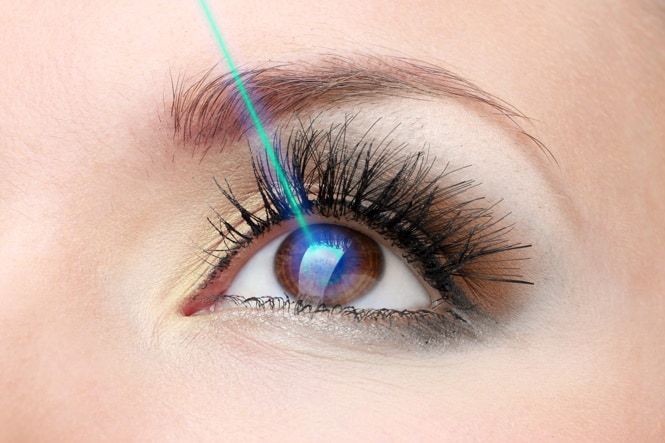People Just Like You Are Asking; Durrie Vision Is Here to Answer!
Wearing glasses or contact lenses isn’t for everyone – and if you ask five people why they want laser vision correction, you’re likely to get five different answers.
Thankfully, there’s a laser eye procedure out there for people with all kinds of refractive errors, and one of them is PRK. Keep reading to learn more about this well-established procedure and how to find out whether you’re eligible for it.
What Is PRK Surgery?
Photorefractive keratectomy, better known as PRK or ASA – advanced surface ablation, is a laser vision surgery that can improve nearsightedness (myopia), farsightedness (hyperopia), and astigmatism.
During the procedure, a refractive eye surgeon uses a laser to change the shape of your cornea. Ensuring your cornea is the right shape corrects the way light rays focus on your retina, the nerve tissues at the back of your eye that are responsible for sending images to your brain.
Is PRK Eye Surgery Safer Than LASIK SBK?
It’s impossible to compare PRK vs. LASIK SBK in this way. Both laser vision surgeries are FDA approved and deemed safe for patients who qualify for them. Both PRK and LASIK SBK use the latest in laser technology and offer optimal clinical outcomes for patients who receive the procedures. In fact, both PRK and LASIK SBK fall under the umbrella of general LASIK procedures; they’re quite similar in that both rely on a laser to reshape your cornea.
Ultimately, the biggest differences in the two is the way the refractive eye surgeon accesses your cornea to reshape it with the laser and recovery time.
- During LASIK SBK, your surgeon will use a laser to create a flap in your cornea. During PRK, your surgeon will apply a special solution to remove only the outer layer of your cornea, called the epithelium.
- PRK has a longer recovery time and can cause discomfort after the procedure. Most patients report this discomfort is manageable and doesn’t affect their daily lives.
How Long Does PRK Eye Surgery Last?
PRK surgery takes only 10 to 15 minutes to complete, with results that are intended to last a lifetime. However, in the future, you may need reading glasses, as losing near vision (presbyopia) is a natural progression as we age, starting around age 40.
If you’re concerned about this, talk to our refractive surgeon about monovision PRK, in which your non-dominant eye is corrected for reading distance, and the dominant one is corrected for distance. Although monovision PRK won’t reverse presbyopia, it can reduce your reliance on reading glasses. Monovision is generally recommended for patients who are in their 40s.
Is PRK Surgery Painful?
Your refractive surgeon applies a local anesthetic to your eyes before performing PRK surgery, and most patients report only minor discomfort during the process. This discomfort feels more like a slight pressure rather than pain.
For a few days after the procedure, you may feel slight discomfort that is easily managed through meditation, relaxation, or certain over-the-counter medications, as approved by your surgeon. In short, PRK is not painful.
How Much Recovery Time Is Needed After PRK Eye Surgery?
A friend or family member can drive you home immediately after your PRK surgery. Some patients take a few days off work as their vision clears and so that they can rest. The most important restrictions for recovery are avoiding physical activity for as long as your refractive eye surgeon recommends – usually a week or two – and wearing sunglasses outside to prevent corneal scarring.
Your vision will slowly improve over the course of three to five days after surgery, and it can take a month before you see the biggest improvements in your vision.
How Much Does PRK Surgery Cost?
PRK surgery costs will vary from patient to patient, city to city, and surgeon to surgeon. The important part to consider about the cost of PRK surgery is that you aren’t using only the price to decide where you’ll have the procedure done. Discount laser vision centers who offer incredible deals are less likely to deliver optimal outcomes. Instead, choose a refractive eye surgeon whose years of experience and involvement in clinical research are testaments to their skill.
Am I a Candidate for PRK Surgery?
The only way to truly know whether you could receive PRK surgery to improve your vision is to undergo an exam with a refractive eye surgeon. So many factors contribute to determining candidacy, and it is not a decision that can be made definitively through any other method.
In general, however, you are not an ideal candidate for PRK if:
- Your eyes are not generally healthy (i.e. you have advanced glaucoma, cataracts, dry eye syndrome, blepharitis, or an ongoing eye infection).
- You are not at least 18 years old.
- Your prescription has changed in the previous year.
- You have uncontrolled diabetes or a disease that affects healing.
- You are pregnant or breastfeeding.
Request an Advanced Ocular Analysis from Durrie Vision in Overland Park, Kansas
To see if PRK surgery is right for you, schedule a free consultation with Durrie Vision. We call our consultation process an “advanced ocular analysis,” because it offers an in-depth look into your eye condition, health, and vision. A thorough understanding of your eyes helps our refractive surgeons ensure optimal outcomes.

Author Bio: Jason E. Stahl, MD
Top Doctors: https://www.castleconnolly.com/top-doctors/jason-e-stahl-ophthalmology-129cc002150
Best Cataract Surgeons: https://bestcataractsurgeons.com/cataract-surgeons/jason-e-stahl/

